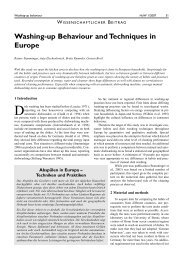Old Washing Machines Wash Less Efficiently and Consume More ...
Old Washing Machines Wash Less Efficiently and Consume More ...
Old Washing Machines Wash Less Efficiently and Consume More ...
You also want an ePaper? Increase the reach of your titles
YUMPU automatically turns print PDFs into web optimized ePapers that Google loves.
Comparison Between <strong>Old</strong> <strong>and</strong> New <strong><strong>Wash</strong>ing</strong> <strong>Machines</strong> HuW 3/2005 131<br />
5 Conclusion<br />
This series of investigations has shown that a considerable<br />
number of rather old washing machines is being used in<br />
German households. Their efficiency under current washing<br />
conditions is worse than expected. This is probably due to<br />
innovations in detergents <strong>and</strong> to continuous adjustments of<br />
new washing machines to these innovations. In consequence,<br />
households owning old machines spend much more money<br />
on operating their machines on the performance level reached<br />
by new washing machines. Early replacement, meaning<br />
replacing old appliances with new ones after a certain time of<br />
use, may be a viable strategy to realise energy <strong>and</strong> water<br />
savings at national or global level. Similarly the possibility to<br />
update the programming of a washing machine, e. g. via<br />
Internet, after it has left the manufacturing plant, may be a<br />
good way of keeping washing programmes up to date <strong>and</strong> of<br />
realising energy savings <strong>and</strong> performance upgrades.<br />
References<br />
BGW (Bundesverb<strong>and</strong> der Gas- und Wasserwirtschaft) (2003a): „Marktdaten<br />
Abwasser“. Presseinformation 24.3.2003<br />
BGW (Bundesverb<strong>and</strong> der Gas- und Wasserwirtschaft) (2003b): „Wasserpreise<br />
in Deutschl<strong>and</strong> stabil“. Presseinformation 10.8.2003<br />
EC95/12 (1995): Commission Directive 95/12/EC of 23 May 1995 implementing<br />
Council Directive 92/75/EEC with regard to energy labelling<br />
of household washing machines. Official Journal of the European Communities,<br />
No L 136/1<br />
HEA (2002): Bilderdienst Informationen über Elektrizität und ihre Anwendung,<br />
Heft 6.5.1 Waschmaschinen. Frankfurt<br />
IEC 60456 (2003): Clothes washing machines for household use – Methods<br />
for measuring the performance<br />
Kemna, R. (2001): Epolis Monitoring <strong><strong>Wash</strong>ing</strong> <strong>Machines</strong> 2001. Report for<br />
AISE (unpublished)<br />
<strong>More</strong>tti, F. (2003): Industrial Commitment – The Case of Wet Appliances.<br />
In: Bertoldi, P., et al. (Hrsg.): EEDAL-Conference 1-3 October 2003.<br />
Proceedings. P. 1125<br />
W ISSENSCHAFTLICHER B EITRAG<br />
SAVE (2001): Revision of energy labelling & targets washing machine<br />
(cloth). Final report. NOVEM, Utrecht 2001; EU-SAVE contract no.<br />
4.1031/Z/98-091<br />
Test (1973-1991): Magazine of Stiftung Warentest. ISSN 0040-3946. Berlin<br />
Acknowledgment<br />
Prof. Dr. Rainer Stamminger,<br />
Dipl.-Oecotroph.Alex<strong>and</strong>ra Barth,<br />
Dipl.-Oecotroph. Susanne Dörr<br />
University of Bonn<br />
Institut für L<strong>and</strong>technik<br />
Section Household <strong>and</strong> Appliance Technology<br />
Nussallee 5<br />
D-53115 Bonn<br />
Germany<br />
Tel. (+49-228) 73-5955<br />
Fax (+49-228) 73-2596<br />
stamminger@uni-bonn.de<br />
This work was supported by Stiftung Warentest, Rethmann<br />
Elektrorecycling GmbH <strong>and</strong> EMPA Testmaterialien. Thanks to<br />
all.





